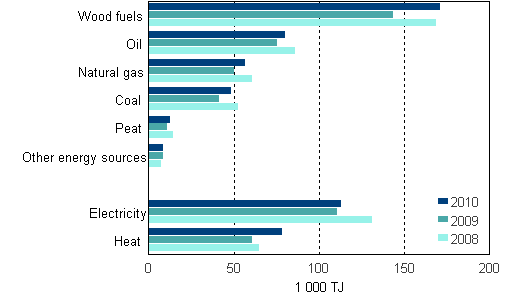Published: 13 October 2011
Recovery of industrial production also increased energy consumption in manufacturing in 2010
According to Statistics Finland, the consumption of energy in manufacturing went up by around 13 per cent in 2010. Energy use in manufacturing totalled 573 petajoule (PJ), which according to preliminary data, is around one half of total final energy consumption in Finland. The use of electricity in manufacturing went up by over ten per cent. Energy use in manufacturing returned nearly to the level of 2008 after the previous year's fall. Energy use increased on account of the recovery of industrial production.
Use of energy sources in manufacturing

The total use of electricity in manufacturing amounted to 42.5 terawatt hours (TWh) in 2010. Over 52 per cent of the electricity used in manufacturing was consumed in the forest industry. The chemical industry accounted for 16 per cent and the manufacture of basic metals for 13 per cent of the total use of electricity. The total use of electricity went up most in the industry of mining and quarrying. In contrast, the use of electricity went down in the electronics and electrical industry, in the textile and clothing industry and in the food industry. Of the regions, the highest amounts of electricity were used in manufacturing establishments in South Karelia and Central Finland, both of which accounted for over ten per cent of all electricity used in manufacturing.
Of fuels the most used in manufacturing were wood fuels, the use of which made up 45 per cent of the volume of fuels used. The use of wood fuels went up by nearly 20 per cent from the year before. Wood fuels were used especially in the wood processing industry for production of electricity and heat. Other significant energy sources for manufacturing were oil and natural gas. The use of nearly all fuels grew from the previous year.
According to preliminary data on the volume of industrial output, industrial production in 2010 grew most in mining and quarrying and in the metal industry. In these industries the consumption of energy also increased most. The biggest energy consumer in manufacturing was the forest industry, which expended 54 per cent of all energy used in manufacturing. Other major energy users were the chemical industry and the manufacture of basic metals. The consumption of energy fell most in the electronic and electrical industry and in the textile and clothing industry. These industries were also the smallest energy users.
The use volume of heat purchased from outside grew by nearly 30 per cent from the previous year. Nearly one half of purchased heat was used in the forest industry. Other big users of heat were the chemical industry and the machinery and metal products industry.
Manufacturing in South Karelia was the biggest user of energy in 2010. South Karelian manufacturing enterprises consumed around 13 per cent of the energy used by manufacturing. In North Ostrobothnia and Itä-Uusimaa manufacturing consumed over ten per cent of the energy used by the entire Finnish manufacturing. In 2010 energy use increased most in North Karelia, where one year previously it had also fallen most.
Source: Energy use in manufacturing, Statistics Finland
Inquiries: Kirsi-Marja Aalto (09) 1734 3442, energia@tilastokeskus.fi
Director in charge: Leena Storgårds
Publication in pdf-format (288.8 kB)
- Tables
-
Appendix tables
- Figures
-
- Appendix figure 1. Use of energy sources in manufacturing (13.10.2011)
- Appendix figure 2. Energy use in manufacturing by energy source 2010 (13.10.2011)
- Appendix figure 3. Energy use in manufacturing by industry (13.10.2011)
- Appendix figure 4. Energy use in manufacturing by region (13.10.2011)
- Appendix figure 5. Total electricity consumption in manufacturing 2010 (13.10.2011)
- Appendix figure 6. Total electricity consumption by manufacturing branch 2009 and 2010 (13.10.2011)
- Appendix figure 7. Total electricity consumption in manufacturing by region (13.10.2011)
Updated 13.10.2011
Official Statistics of Finland (OSF):
Energy use in manufacturing [e-publication].
ISSN=1798-7776. 2010. Helsinki: Statistics Finland [referred: 19.4.2025].
Access method: http://stat.fi/til/tene/2010/tene_2010_2011-10-13_tie_001_en.html

